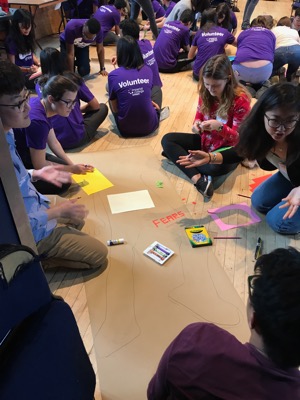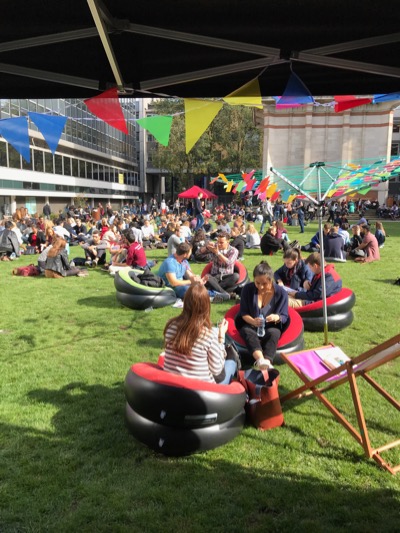Commission for Global Dimensions of Student Development
Saturday, 6 October 2018 - 5:07pm
Tales from Across the Pond:
Higher Education in the UK: Similar Trends, Different Structures
By Emelie Helsen Move in day in one of our residence halls, which is based in South Kensington, right in the centre of London.
Move in day in one of our residence halls, which is based in South Kensington, right in the centre of London.
As a seasoned student affairs professional in the United Kingdom, with a 3-year interruption while I undertook my studies in the U.S., I wanted to share about some of my experiences in England specifically. Why do I think that is important? Because as SA educators, wherever we are based, we can all learn from each other, be exposed to different jargon and HE-specific language, and really understand how much the context of the environment and society we function in influences the work we do.
So, what is so different? Reflecting on the trends and issues, much of what we encounter here in England is very similar to the U.S. and Canada. Themes that are currently high on our agenda due to government decisions and/or priorities, the changes in student populations, service delivery, and what society throws at us are:
- Student Wellbeing- Imperial College is an urban research- intensive STEM (and business) university whose students are extremely high achieving, and is considered the most international university in the UK. In a highly competitive environment, in which half of our student body are Undergraduate students, and the other half are Postgraduate Taught and Research students. At Imperial College specifically, we are in the consultation stages of a new (and first!) Student Support strategy, of which supporting students through mental health is a large part. Furthermore, this year, I have been part of the Active Bystander Initiative at Imperial for which we received government funds. On a national platform, Student Minds offers a range of training and resources for students and professionals. They are also about to start developing ‘The University Mental Health Charter’
- Sexual violence prevention and education- Many universities, driven by their own leadership and/or HEFCE (the Higher Education Funding Council For England, now mainly absorbed by the Office for Students since March 2018) have started initiatives and programmes that support survivors, write policies specifically for sexual violence, create reporting tools for on-campus related issues, etc. There is no title IX in England or the UK, yet institutions of course see the value and need of providing these programmes and services. Imperial’s very own Dr Emma Chapman also is a campaigner on sexual misconduct in HE through the 1752 group, which focuses on staff-to-student sexual misconduct in Higher Education.

Our helloicucrew who are current students who welcome new students on campus in training. Here they were asked to draw the thoughts, opinions, fears, etc. of what new students come with to us.
- The Office for Students- As mentioned above, the newly established Office for Students was created very recently. The office exists to regulate English higher education providers on behalf of all students. They have a regulatory framework that explains their work and work in 4 main areas: getting into and succeeding in higher education, helping students stay informed, ensuring a high-quality education that prepares students for the future, and protecting students’ interests. So, in a nutshell, they have the same aims as what we hope each SA educator and academic staff work towards as well. How this all pans out in terms of ensuring their work is done, is equitable, and even holds government to account, is to be seen. As most institutions in England are public institutions, this body regulates a lot of what needs to be done. I’ll be honest, I am still getting my head around what has changed, what has not, and what freedom institutions have to achieve their mission and strategies.
- A part of the Office for Students remit is ‘Access and Widening Participation’. Institutions need to report their efforts in getting students from marginalised communities to Further and Higher Education, and they often receive financial support for this. At Imperial, a new Equality, Diversity, and Inclusion strategy is being worked on, which will include elements of getting those students to colleges and universities, but at Imperial, it is particularly important for us to focus on how we keep them at Imperial. Our student body remains predominantly male and white. And while we have a lot of international students, they mainly hail from China. A lot of our students have been privately educated at the secondary level. And then our staff- equally, if not more, male and white. And old. And straight. And cisgender. Now don’t get me wrong, we have some excellent academic and professional staff who are committed to making our community inclusive and open. But we are trying to turn around a cruise ship, so to speak. A shift in culture and understanding needs to happen. I have faith that we can, as long as we are willing to have disruptive conversations, hold each other to account, and be willing to listen to the lived experiences of our most marginalised students. Then we will move forward, regardless of a regulatory framework or possible funding.
- Talking about disruptive, the main topic that is talked about daily is of course, Brexit. As you may be aware, the UK (well, British and Commonwealth citizens in the UK, not Europeans residing in the UK) was asked to vote in a referendum to remain or leave in Europe on 23rd June 2016. I remember sitting on a friend’s sofa at Michigan State, clustered to the screen when the results rolled in. A wave of anger, despair, disbelief, frustration, and sadness overcame me. Now, again, I could talk about the possible consequences Brexit has on my personally (particularly as I am a Belgian citizen who does not have ‘settled status’ in the UK), but the focus here is Higher Education. And I can confirm, we have no idea. We are supposed to leave the EU in March 2019, yet we have no answers for our European academic and professional staff, current and prospective European students, European research funding, ERASMUS exchanges, and so on. What I do know is that rocky waters are ahead. But answers, I haven’t got them.

We asked helloicucrew to write welcome messages to new students, which were then displayed on a washing line at our Home from Home stall during Welcome Week. The aim of the messages was to inspire new students and alleviate some of their worries.
There are so many other things I could be sharing about, in terms of themes or topics that get discussed on a daily basis. The government’s Prevent initiative, the NSS, the TEF and REF, free speech on campus, you name it. But providing such important information in such short time would not do it justice, because you guessed it, these are all things that are usually discussed, challenged, and supported in Higher Ed courses and programmes of study.
So how do we, here in England, deliver services and programmes that achieve positive and growth goals related to the themes I shared? Well, as one of my former faculty members used to say: that depends. Our services depend on the different structures and environments they function in:
- Institutional types. While we don’t have the Carnegie Classification as in the U.S., we do have different mission groups, based on their, you guessed it, mission. For instance, Imperial College is part of a group of 24 universities called the Russell Group as we are research-intensive while also focusing on the learning experience. They are all referred to as red-bricks, because of the institution’s age and wealth.
- Students. With these institutional types come different student bodies. It is no secret that the identities represented at Universities such as Oxford and Cambridge are vastly different to those at the University of East London and Oxford Brookes University. Knowing this matters a great deal. It means programmes and services look and feel differently, and in my experience and opinion, those institutions that are not as highly ranked or don’t belong to the Russell Group are better at supporting students in their holistic development and/or aspects of their identities.

Students chilling at our Home from Home stall on the Queen’s Lawn, the main centre of our South Kensington Campus. The washing line demonstrates the messages for students from helloicucrew.
- As in the U.S., the UK is renowned for attracting international students. Here, they are grouped as Home/European students (for now?) and overseas students, often because of their tuition-fee status. Overseas students pay a lot more than European students. Yet all international students may experience culture shock, discrimination, a different (set of) transition(s) than ‘home’ a.k.a. domestic students. Similarly to the U.S., we have international offices that focus largely on recruitment of international students, yet a lot more is to be said about support services that support the transition and retention of international students- and I speak here from both my experiences as having been an international student in the UK and the U.S., and my experience as a professional in Higher Ed.
- The changing landscape of tuition fees. In the last 12 years, tuition fees have trebled for students. In return, government funding has decreased drastically. While students want more bang for their buck, we are having a hard time explaining that the income from their fees is really just balancing out the money we are no longer receiving from the government, so we have to do more, with less. The ‘students as consumer’ debate rages on in England, and has an impact on the perception of the higher education sector within society, the students themselves, their parents, employers, and so on. If you are based in the U.S., this is probably a very familiar story. Here, it feels still less familiar because the change happened so quickly and drastically in a short amount of time. Friends of mine who studied here are still talking about their maintenance grants they received while at university while not having to pay fees. Government and university leaders are those who have benefited from those excellent circumstances.
- Students’ Unions. As in Canada, and many other countries around the world, Students’ Unions (or Associations, Guilds, etc.) are central to the student experience. I am not talking about the building, because most SU’s here do not have their own building, but what they stand for and/or what they do for students. In one shape, way, or form, each college or university should have one, as required by the law. Unions are student-led- literally, through elected student officers who take a year out during or after their studies to be paid full time to represent students and be trustees of their Students’ Union as a charity. These students are then supported by employed professional staff (hello, me!) who help them achieve their manifesto aims while achieving the strategy the Board of Trustees sets out. SU’s can opt in to become an affiliated member of the National Union of Students (NUS), which is a lobbying, representative body for 7 million students in the UK. Imperial College Union, who I work for, is not affiliated. The pros and cons of that are for another blog ;-). Sounds complicated? Yup, it sounds like it. But in reality, it is a fast-forward moving environment that is successful when it operates in collaboration with their institution as a critical friend.

Freshers fair day, where hundreds of stalls of student-led organisations, college departments, and external companies showcase their activities and programmes. This shot was taken from the LGBT+ society looking at the Queen’s Tower.
- Perhaps one of the most striking differences I reflected on from my experience in the U.S. and UK is that students here in England are deemed independent from the moment they get to college/university. We do not like the parental involvement in the way the U.S. embraces it. Yes, there are services and programmes available for students to succeed and be supported, but it feels so very different. I remember incidents I would be called for involving drunken students in residence halls in the U.S. that would be dealt with so very differently here in the UK. Of course, because the drinking age is different, but the level of involvement from SA professionals is very different. And I like it like that, it works for my values, what I believe the outcomes are of a Higher Education experience. Even though in the U.S. the talk is that the principle of ‘in loco parentis’ has moved on and evolved into something different, it really is different in comparison to here.
- Functional areas. Student Affairs as a field and profession has very different foundations in each country, as it should. That means the way areas are structured and named are different again. For instance, fraternity and sorority life is barely a thing in England. However, the large amount of student organisations that we call sports clubs and societies fulfil a very similar function. Student Services departments comprise of different sub sections, which are often called Student Life, cover support for students with disabilities, financial support, counselling/ wellbeing, Sport (yeah, we don’t have those big stadiums as in some of the U.S. institutions), and so on. Our professional staff teams in Student Services and Students’ Union areas are much smaller as Student Affairs divisions elsewhere, which does mean the silo working is a bit more reduced. I say a bit, because we all have a tendency to do it.
- The SAPro also needs a mention. We don’t really identify as a field or profession, and don’t have the pillars and competencies laid out explicitly. In my office, I am the only one with a Master’s in Student Affairs, and guess what, we do just fine. Don’t get me wrong, I value very highly what my Master’s taught me and it influences my work on a daily basis, but the opportunities to develop as a professional are very different. We have some professional organisations such as AMOSSHE, the AUA, and SEDA but they are small, and do not produce the level of publications and research in the same way ACPA does. That also means opportunities to attend conferences, courses, and webinars are much less. And now, we also do have a Master’s in Student Affairs in Higher Education that can be pursued in part-time or full-time mode. So, small steps, which is why I remain involved in the international Student Affairs communities because all perspectives are useful for me to continue to grow as an SA Educator.
Bio of Emelie Helsen:

Emelie was born and raised in Belgium, and as a first-generation student didn’t succeed at what she had set out for herself at home. She then went to the United Kingdom to pursue her Undergraduate Degree at Staffordshire University, and like many of us, stumbled into Student Affairs during and after her studies. Initially, she was based in the Union supporting all Student Activities work, in addition to student organisations, which then evolved when she moved to London. Stints and roles at City University, London and Kingston University exposed her to advocacy and welfare work, student government, orientation/ welcome, and many other pockets of SA work. During her time at City, she completed her Postgraduate Certificate in Academic Practice. A few years later, she moved to Michigan to pursue her Master’s in Student Affairs Administration (Go Green!) while undertaking an assistantship in Residence Education and Housing Services. She then moved on to American University (Go Eagles!) to be a Community Director for one year, on her extended student visa. Now, she is a Student Development Manager at Imperial College Union in London, and is about to start her EdD in Education and Social Justice at the University of Birmingham alongside her full-time employment.

